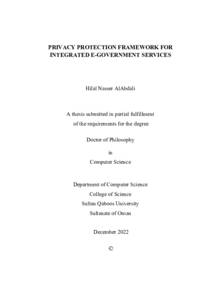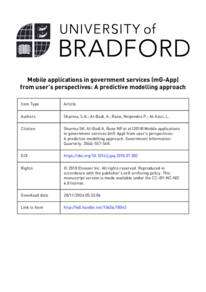Document
Privacy preservation framework for integrated e-government services.
Other titles
إطار للحفاظ على الخصوصية لخدمات الحكومة الإلكترونية المتكاملة
Publisher
Sultan Qaboos University.
Gregorian
2022
Language
English
Subject
English abstract
Automating government services is often one of the steps toward achieving e-government. Automating services sometimes requires integrating information from
various government entities to improve electronic services' effectiveness, efficiency,
and accessibility. With this, government entities can integrate their data through
electronic channels without being confined by time or location. In the absence of
preventive measures, this could result in privacy violations and data misuse. In contrast,
the government of Oman, for example, has started enacting regulations that protect
information. They require service providers to embed privacy rules and policies into
integrated services' design specifications and architecture to make it a key enabler of
data protection. Furthermore, trust is one of the most critical factors determining a
person's willingness to take advantage of electronic government services, and
protecting personal information can affect trust. Despite its significance, most previous
studies have focused on the factors leading to trusting such services from a theoretical
perspective without considering the technical aspects. Consequently, more effort is
needed in the current debate on the effect of preserving privacy on trust within
integrated e-government services.
Specifically, this study aims to develop a privacy-preserving framework for integrated
e-government services by investigating the challenges of designing an e-government
architecture using the optimal business tool and the most efficient service design
approach to protect privacy from misuse. A literature review indicates some drawbacks
to current privacy frameworks, and most of them preserve privacy abstractly, while
privacy tools are missing. To fill those gaps, this study interviewed 14 experts and
managers involved in the Oman e-government initiative and familiar with integrating
various government entities. The results show a need for some technical,
organizational, and situational requirements (instruments) that can be used to design
the required framework. Additionally, 420 respondents were asked to participate in
this study and were familiar with using e-government services in Oman. Results
indicate that several factors related to protecting personal information from misused
can influence service trust, including privacy lifecycle protection, privacy controls,
impact assessments, and preventive monitoring. Furthermore, the specifications and
designs of each of these instruments have been validated using Q-sorting, reliability,
and normality, and a conceptual framework has been developed after hypothesizing
the correlations between dependent and independent instruments.
Several methods are utilized in this study to assess the proposed framework. An
experimental evaluation is conducted using validated data to test the conceptual
framework as a first method. The results indicate that all instruments in this study
perceive privacy as a factor that positively influences service trust. A second
evaluation method is to apply the proposed framework to one of the government
entities by redesigning one of its key service schemas and testing it with 14 test cases
and 73200 test requests to evaluate the impact of the implementation of the proposed
framework. Results indicate that implementing the framework will enhance service
delivery using less memory, more threads, and fewer request statistics. Lastly, the
framework results have been compared with the most related frameworks. This
comparison shows that the proposed framework is superior to those currently available.
By filling the gaps in the literature, this study contributes theoretically by examining
the impact of privacy-preserving instruments on trust within integrated e-government
information. It also contributes to regional knowledge since few empirical studies have
been conducted on trust factors in Arab countries like Oman. This study extends
existing knowledge by highlighting the relationship between privacy-preserving
instruments and trust for integrated e-government services. In contrast, this study
contributes practically by improving citizens' trust, creating a culture of openness by
enabling them to provide accurate information and encouraging them to utilize e-government services. Accordingly, this study emphasizes the need for government
entities to use and implement the proposed framework to increase citizen trust and
provide better service.
Member of
Resource URL
Arabic abstract
أتمتة الخدمات في الغالب ما تكون الخطوة الاولى نحو تحقيق رؤية الحكومات الالكترونية. حيث إنها تتطلب تكامل المعلومات بين مختلف الجهات الحكومية لتحسين فعالية الخدمات وكفاءتها وإمكانية الوصول إليها. وبهذه الطريقة يمكن للجهات الحكومية دمج بياناتها من خلال القنوات الالكترونية دون التقيد بالوقت أو الموقع، وعليه فإن هذه الطريقة في التكامل قد تزيد من فرص انتهاك الخصوصية أو إساءة الاستخدام البيانات أثناء عملية التبادل. لذا بدأت العديد من المنظمات الحكومية في سن اللوائح لحماية المعلومات من خلال مطالبة مزودي الخدمة بتضمين الخصوصية في المواصفات عند تصميم الخدمات المتكاملة لجعلها عامل تمكين رئيسي لحماية البيانات. عالوة على ذلك، تعد الثقة من أهم العوامل التي تحدد مدى القابلية من قبل الاشخاص للاستفادة من خدمات الحكومة وبنا ًء ذلك، فقد ركزت معظم الدراسات السابقة على العوامل التي تؤدي إلى زيادة الثقة في مثل الالكترونية. على هذه الخدمات من منظور نظري دون النظر إلى الجوانب الفنية. وبالتالي، هناك حاجة إلى مزيد الدراسات للحفاظ على الخصوصية التي تتركز على أن الثقة هو العامل الرئيسي لنجاح الخدمات الحكومة الالكترونية المتكاملة.
تهدف هذه الدراسة إلى تطوير إطار عمل للحفاظ على الخصوصية لخدمات الحكومة الإلكترونية المتكاملة من خالل التحقيق في التحديات التي تواجه تصميم بنية الحكومة الإلكترونية باستخدام أداة الاعمال المثلى ونهج تصميم الخدمة الأكثر كفاءة لحماية الخصوصية من سوء الاستخدام. تشير مراجعة الادبيات إلى بعض العيوب في أطر الخصوصية الحالية، حيث أن معظمها يحافظ على الخصوصية بشكل مجرد ونظري، في حين أن أدوات الخصوصية غير موجودة لسد هذه الثغرات، لقد أجرت هذه الدراسة مقابلات مع 14 من الخبراء والمديرين المشاركين في مبادرة الحكومة الإلكترونية في سلطنة عمان و الذين يعملون وعلى دراية بدمج مختلف الجهات الحكومية. تظهر النتائج الحاجة إلى بعض المتطلبات الفنية والتنظيمية والظرفية التي يمكن استخدامها لتصميم الإطار المطلوب. بالإضافة إلى ذلك طلب من 420 من مشاركا المشاركة في هذه الدراسة من الذين سبقوا واستخدموا الخدات الحكومية الإلكترونية في عمان. تشير النتائج إلى أن عدة عوامل تؤثر على ثقة الخدمة، بما في ذلك حماية دورة حياة الخصوصية، وضوابط الخصوصية، وتقييمات التأثير، والمراقبة الوقائية. عالوة على ذلك، تم التحقق من صحة مواصفات وتصميم هذه الادوات باستخدام أداة Sorting-Q وتم حساب الثقة بين الاداة وصاحب البيانات ، بناء عليه يمكن استخدام الاطار المقترح في مبادرة أي حكومية كانت.
البيانات، بناء عليه تم استخدام عدة طرق لتقييم الاطار المقترح. حيث إنه تم إجراء تقييم تجريبي باستخدام مجموعة بيانات تم التحقق من صحتها سابقا حتى يتم اختبار الاطار المفاهيمي. تشير النتائج إلى أن جميع الادوات في هذه الدراسة تنظر إلى الخصوصية كعامل يؤثر بشكل إيجابي على ثقة المواطنين. تتمثل طريقة التقييم الثانية في تطبيق الاطار المقترح على إحدى الجهات الحكومية من خلال إعادة تصميم أحد مخططات الخدمة الرئيسية واختباره مع 14 حالة اختبار و73200 طلب اختبار لتقييم تأثير تنفيذ الاطار المقترح. تشير النتائج إلى أن تنفيذ إطار العمل سيعزز تقديم الخدمة باستخدام ذاكرة أقل، وقدرة أكبر، وعدد أقل من إحصائيات الطلب. أخيرا، تم تقييم نتائج إطار العمل من خلال مقارنتها بأكثر الاطر مقاربة لهذه الدراسة. حيث يظهر في المقارنة أن الاطار المقترح أفضل من الاطر المتوفرة الان لذا ومن خلال سد الثغرات الموجودة في الادبيات، نستنتج أن هذه الدراسة تساهم نظريًا من خلال فحص تأثير أدوات الحفاظ على الخصوصية على الثقة في معلومات الحكومة الالكترونية المتكاملة. كما أن الدراسة تساهم إقليميا حيث إنه تم إجراء القليل من الدراسات التجريبية حول عوامل الثقة في الدول ً بشكل كبير في المعرفة العربية. بالاضافة إلى ذلك تساهم هذه الدراسة في توسيع نطاق المعرفة الحالية من خلال تسليط الضوء على العالقة بين أدوات الحفاظ على الخصوصية والثقة في خدمات الحكومة الالكترونية المتكاملة. في المقابل تساهم هذه الدراسة عمليًا في تحسين ثقة المواطنين، وخلق ثقافة الصراحة من خلال تمكينهم من تقديم معلومات دقيقة، وتشجيعهم على الاستفادة من خدمات الحكومة الالكترونية. وبنا ًء عليه، تؤكد هذه الدراسة على حاجة الجهات الحكومية لاستخدام وتنفيذ الاطار المقترح لزيادة ثقة المواطن وتقديم خدمة أفضل.
تهدف هذه الدراسة إلى تطوير إطار عمل للحفاظ على الخصوصية لخدمات الحكومة الإلكترونية المتكاملة من خالل التحقيق في التحديات التي تواجه تصميم بنية الحكومة الإلكترونية باستخدام أداة الاعمال المثلى ونهج تصميم الخدمة الأكثر كفاءة لحماية الخصوصية من سوء الاستخدام. تشير مراجعة الادبيات إلى بعض العيوب في أطر الخصوصية الحالية، حيث أن معظمها يحافظ على الخصوصية بشكل مجرد ونظري، في حين أن أدوات الخصوصية غير موجودة لسد هذه الثغرات، لقد أجرت هذه الدراسة مقابلات مع 14 من الخبراء والمديرين المشاركين في مبادرة الحكومة الإلكترونية في سلطنة عمان و الذين يعملون وعلى دراية بدمج مختلف الجهات الحكومية. تظهر النتائج الحاجة إلى بعض المتطلبات الفنية والتنظيمية والظرفية التي يمكن استخدامها لتصميم الإطار المطلوب. بالإضافة إلى ذلك طلب من 420 من مشاركا المشاركة في هذه الدراسة من الذين سبقوا واستخدموا الخدات الحكومية الإلكترونية في عمان. تشير النتائج إلى أن عدة عوامل تؤثر على ثقة الخدمة، بما في ذلك حماية دورة حياة الخصوصية، وضوابط الخصوصية، وتقييمات التأثير، والمراقبة الوقائية. عالوة على ذلك، تم التحقق من صحة مواصفات وتصميم هذه الادوات باستخدام أداة Sorting-Q وتم حساب الثقة بين الاداة وصاحب البيانات ، بناء عليه يمكن استخدام الاطار المقترح في مبادرة أي حكومية كانت.
البيانات، بناء عليه تم استخدام عدة طرق لتقييم الاطار المقترح. حيث إنه تم إجراء تقييم تجريبي باستخدام مجموعة بيانات تم التحقق من صحتها سابقا حتى يتم اختبار الاطار المفاهيمي. تشير النتائج إلى أن جميع الادوات في هذه الدراسة تنظر إلى الخصوصية كعامل يؤثر بشكل إيجابي على ثقة المواطنين. تتمثل طريقة التقييم الثانية في تطبيق الاطار المقترح على إحدى الجهات الحكومية من خلال إعادة تصميم أحد مخططات الخدمة الرئيسية واختباره مع 14 حالة اختبار و73200 طلب اختبار لتقييم تأثير تنفيذ الاطار المقترح. تشير النتائج إلى أن تنفيذ إطار العمل سيعزز تقديم الخدمة باستخدام ذاكرة أقل، وقدرة أكبر، وعدد أقل من إحصائيات الطلب. أخيرا، تم تقييم نتائج إطار العمل من خلال مقارنتها بأكثر الاطر مقاربة لهذه الدراسة. حيث يظهر في المقارنة أن الاطار المقترح أفضل من الاطر المتوفرة الان لذا ومن خلال سد الثغرات الموجودة في الادبيات، نستنتج أن هذه الدراسة تساهم نظريًا من خلال فحص تأثير أدوات الحفاظ على الخصوصية على الثقة في معلومات الحكومة الالكترونية المتكاملة. كما أن الدراسة تساهم إقليميا حيث إنه تم إجراء القليل من الدراسات التجريبية حول عوامل الثقة في الدول ً بشكل كبير في المعرفة العربية. بالاضافة إلى ذلك تساهم هذه الدراسة في توسيع نطاق المعرفة الحالية من خلال تسليط الضوء على العالقة بين أدوات الحفاظ على الخصوصية والثقة في خدمات الحكومة الالكترونية المتكاملة. في المقابل تساهم هذه الدراسة عمليًا في تحسين ثقة المواطنين، وخلق ثقافة الصراحة من خلال تمكينهم من تقديم معلومات دقيقة، وتشجيعهم على الاستفادة من خدمات الحكومة الالكترونية. وبنا ًء عليه، تؤكد هذه الدراسة على حاجة الجهات الحكومية لاستخدام وتنفيذ الاطار المقترح لزيادة ثقة المواطن وتقديم خدمة أفضل.
Category
Theses and Dissertations


